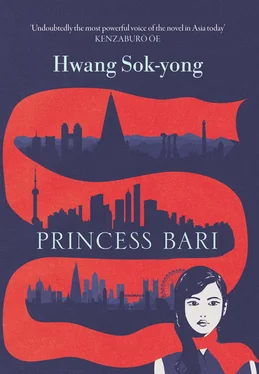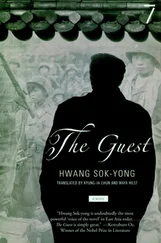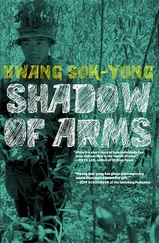One day he said: “If things go well, you’ll be able to find a new place to work.” Uncle Lou had a Vietnamese neighbour who owned a nail salon. He had told her he would vouch for me, and suggested we visit the salon together when the restaurant was closed on Monday.
“You’re young and you work hard, so there’s hope for you, despite that stupid debt of yours. If you can make better wages, you’ll pay it off within a year.”
I bowed deeply to him in gratitude. I thought about Uncle Salamander that day for the first time in a long while. It was as if he’d followed me to London to watch over me. Tears poured out of me. It had been so long since I’d felt overcome with emotion that I thought I’d used up all my tears. Uncle Lou held out a freshly laundered napkin for me to wipe my eyes with.
“I left a daughter behind in China years ago. She must be about your age now.”
That Monday, I left Chinatown for the first time since arriving and took the London Underground with Uncle Lou. I was so afraid of losing him in the crowd that I clung to the hem of his shirt each time we got on and off the train. I learned later that the name of the station we were going to, and the neighbourhood it was in, was “Elephant and Castle”. We went out one of the exits, crossed several streets in front of the plaza and arrived at the Tongking Nail Salon. Like the restaurant we worked at, it appeared to be open all week except Mondays. My life had been limited to Chinatown, where almost everyone was East Asian and resembled each other; there was the occasional white tourist, but they were just passing through. But as I walked around Elephant and Castle, I saw all kinds and colours of people. I saw yellow faces, brown faces, black faces and occasionally a few white faces — but they weren’t British; they blended in well enough, but were actually construction workers from Poland and the Czech Republic. Everyone else was a person of colour, like us.
Uncle Lou tapped on the glass door of the empty nail salon. A man who’d been reading a newspaper in one of the massage chairs looked up, smiled and came over to unlatch the door. He was small and wiry, wore a white gown over his clothes and looked Vietnamese. He and Uncle Lou spoke English to each other. I could tell from the way Lou gestured and glanced back at me that he was making an introduction, so I bowed and greeted the man. This was Uncle Tan, the owner of the salon.
“Let’s show him what you can do,” Uncle Lou said.
Uncle Tan placed a stool in front of the chair and set his feet on it. I offered to start by washing his feet first, but Lou replied that Uncle Tan only needed a preview.
I squatted down before Tan’s thin, bony feet and closed my eyes for a moment. The paths he had walked came to me faintly at first, but then they stood out clearly and began to move past, scene by scene. A cement wall collapsed, and a horde of people surged through the break. I spotted Tan amid the crowd, dressed in a black leather jacket. Then I saw him crossing hills and fields in another country, then taking a boat down a canal.
“Kid, what’re you doing?” Lou asked. “Why haven’t you started yet?”
I opened my eyes.
“This man came from a place with a broken wall. He climbed over a mountain and rode a boat.”
Uncle Lou translated, and their eyes widened.
“How do you know that?” Lou asked. “Tan was in East Germany when the wall came down. Then he crossed the border into the Netherlands, and lived in Amsterdam for several years.”
I nodded.
“Whenever I look at someone’s feet, I can tell where they’ve been.”
I added that I could also tell whether they were sick or healthy. I began to rub Uncle Tan’s feet. A red aura appeared to me around the meridian point at the centre of the bottom of his foot. When I pressed it, he let out a low sigh. I repeated the eight steps of the basic foot massage and massaged about half the acupressure points of the foot, which numbered more than one hundred.
“Your kidneys are unhealthy,” I said, wiping the beads of sweat from my forehead.
When Uncle Lou translated this, Tan shook his head and whistled. He stood up, took a ten-pound note from his trouser pocket and handed it to me.
“Take it. You did good work.”
Lou translated again. I bowed my head in gratitude and took the money. The two of them spoke for a long time. On the way back, Lou told me: “He wants to hire you. Didn’t I say you have talent?”
I began working at Tongking the very next week. Uncle Tan had me move in with a Bangladeshi woman who worked at the salon. Luna was three years older than me. She was only twenty, but had already had two kids. She’d married at sixteen and become pregnant right away, but after a few years, she left her husband and came to London. After she and I became friends, she showed me the scars on her back and thighs from where her husband had beat her.
As usual, luck was on my side. There were low-income, high-rise apartment buildings near the salon that were subsidized by the district office, but the conditions were terrible. Most of the flats were tiny and consisted of only a single room, or a room with a living room-slash-kitchenette. Children ran wild through the hallways, and the flats were crammed with up to ten people each. Most of the tenants were immigrants, but Luna lived on a street lined with row houses in a borough called Lambeth. It was just as poor as the other neighbourhood, but quieter and safer. The whitewashed brick buildings, which were so old I had no idea when they’d been built, looked clean from the outside. Each row house was three stories with a half-basement; it was in one of these half-basements that I came to live with Luna. A flight of stairs at the entrance of the building led down to her flat, but our kitchen opened onto a small terrace so it didn’t feel that much like being underground.
As this place became my new world, I should probably introduce the other people who lived there. As soon as you came down the stairs, you saw a narrow hallway with doors on each side facing each other. Each flat was a long rectangle divided into a kitchen and a room that served as both bedroom and living room. A Nigerian couple lived across from us. The husband worked at a gas station, and the wife was a part-time housekeeper.
The first-floor flat on the right was occupied by a Chinese cook and a Filipino janitor, who were roommates like Luna and me. The flat on the left had a Sri Lankan family living in it. They ran a small restaurant nearby. Up on the second floor was a Polish family. The husband did home repairs and ran seasonal work teams staffed with labourers from his hometown. His wife and daughter worked together as shop assistants. Living in the flat to the left of theirs was Abdul, an elderly man from Pakistan. His was the only name I remembered, because Luna had taken me to meet him right after I moved in.
Grandfather Abdul, who managed the units in our building, wore a traditional tunic that buttoned all the way up to his throat and came down to his knees. His beard was white, and his brown skin looked as though it had been darkened by the sun. When Luna introduced me to him, he prepared tea for us that smelled like mint. He was always reading from a thick book, his reading glasses perched low on his nose. Only later, after I’d picked up some English and was able to converse with him, did I learn that it was the book of Islamic scripture, the Qur’an.
The landlord, a forty-something Indian man, came by on occasion to visit Grandfather Abdul. He was always sharply dressed in a suit and tie, and had never once spoken to me or even so much as greeted me. The first time I bumped into him out front, I thought he was from the immigration office and nearly turned and ran. Grandfather Abdul always called him “Mr Azad”, even though the landlord looked young enough to be his son.
Читать дальше












